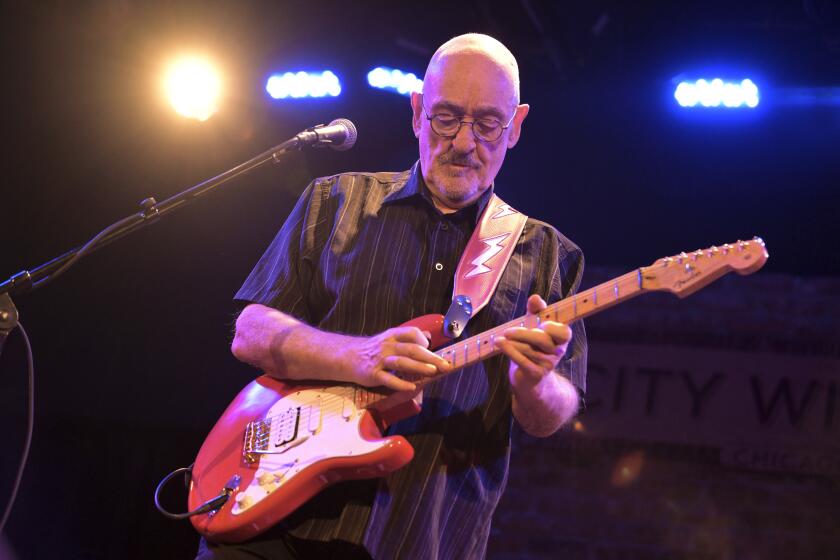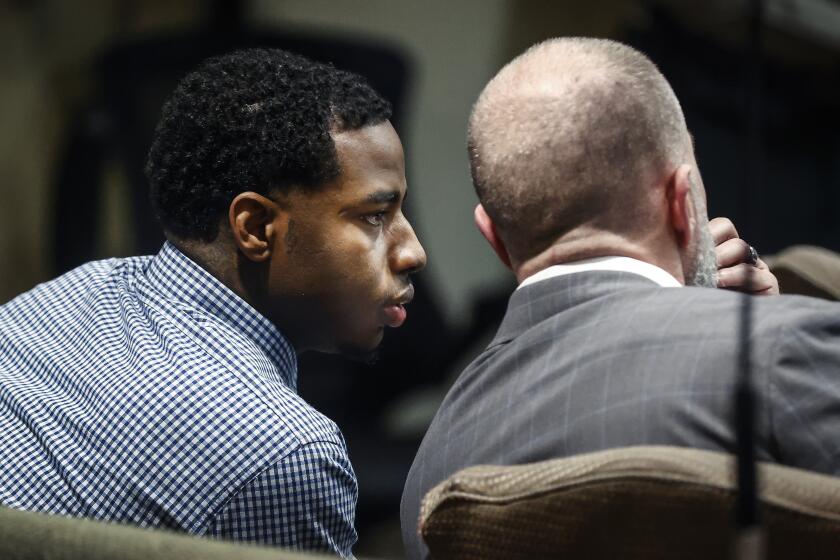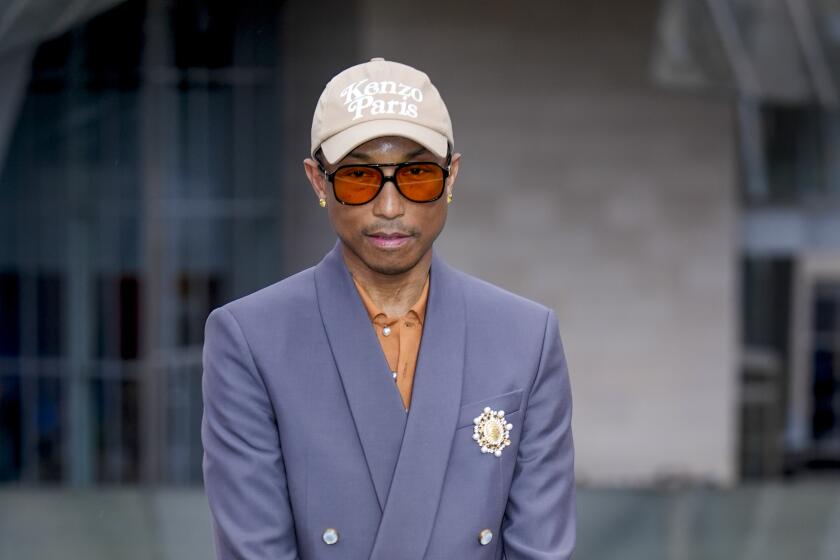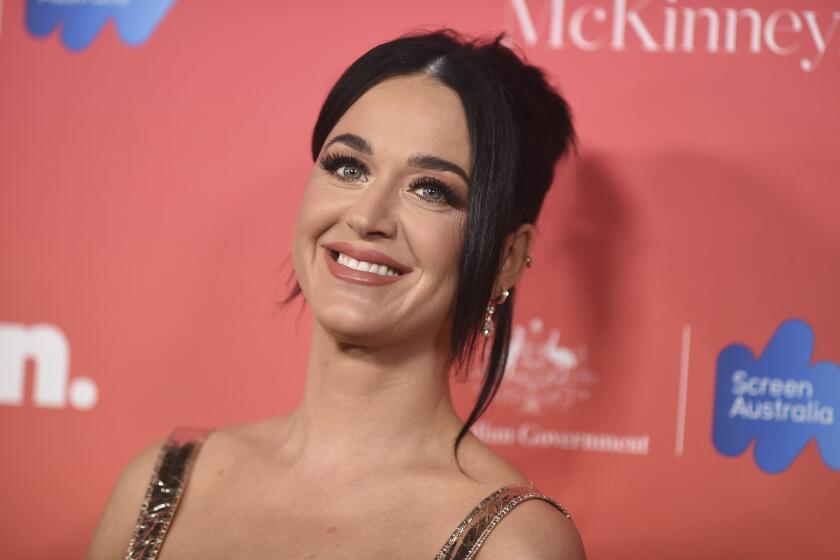RADIO : The Love Doctors...
A young man calls seeking counsel about how to deal with a male friend who has made sexual overtures toward him. Another caller says that he is having an affair with his twin brother’s wife and that they have had a child together. Another wants to know whether marijuana is as dangerous as other drugs.
A female calls, desperate: A friend has just committed suicide and she feels as if she wants to kill herself too.
Just another night in the life of talk radio? Not quite. The suicidal caller is 14. The other calls also come from teen-agers. And the advice being dispensed to them is being heard by thousands more Southern California teens.
The program is “Loveline” on alternative rock station KROQ-FM (106.7).
“Loveline”--which vacillates between a raunchy party atmosphere and a serious discussion of health issues--is hosted by longtime KROQ deejay Jim (Poorman) Trenton and Dr. Drew Pinsky, who has an internal medicine practice and specializes in chemical dependency. The two hosts, joined nightly by young celebrity “love doctors,” have vastly different styles and perspectives about the show’s purpose, which is part of its appeal.
The combination of their verbal sparring, the celebrity guests, the straightforward information about intimate subjects and the inherent voyeuristic nature of such talk shows has made “Loveline” the hottest nighttime radio program around.
The most recent Arbitron ratings showed that “Loveline” was drawing an average of 76,000 listeners during any given quarter-hour on Sunday nights, making it the most listened-to show in its time slot. It was drawing 46% of the listeners between the ages of 12 and 17, and 42% of those between 18 and 24.
“The ratings speak for themselves and sort of hit you in the face,” said KROQ General Manager Trip Reeb. So last February, the station expanded the show from just Sundays to Sunday through Thursday, 10 p.m. to midnight. (Ratings data is not yet available for the additional nights.)
“Loveline” is not confined merely to matters of the heart.
The bulk of “Loveline” calls come from teen-agers and focus on concerns as diverse as family, moods, sexual behavior, physiological functioning, drugs and sexually transmitted diseases.
“The whole premise of this show is that when people have problems, they call their friends,” said Trenton, who introduced the program 10 years ago. “I’m the kind of guy who’s really open and friendly, and people are just calling me as a buddy who just happens to be a radio deejay. . . . The whole point of this show is not necessarily that our advice works but to offer a place to talk their problems out. It just allows people to call in and talk about things.”
“This is an age group for whom education can have a dramatic impact on their health,” Pinsky said. “There is a total distrust for what information is available, so we’re trying to give it to them in a more palatable way.”
Some of those who called in recently said they did so because they found that sound practical advice had been dispensed to other callers.
“I’ve been listening to ‘Loveline’ since I was 17,” said Martin Smith, a 22-year-old caller. “Dr. Drew is there to make everything serious, and Poorman is there to make it a comedy. I feel like they give some good advice, especially Dr. Drew. If you have a personal problem, you can talk your problems out with them.”
“I’ve been listening for a few years and I’ve heard other callers with problems, and you hear them calling back a few months later really happy,” said a 17-year-old who called contemplating suicide.
“Depression in teen-agers is very common,” Pinsky told the suicidal caller on the air. “Teen-age males especially get suicidal. The suicidality you feel is just a symptom of your depression. You have to really listen to your feelings. When you’re this depressed you need to get some help. There’s no reason to suffer silently. You’ve got to get some help.”
Pinsky then gave him a phone number for a suicide prevention hot line and urged him to call immediately. He also gave that number to the 14-year-old girl who said she was considering suicide because one of her friends had recently killed herself.
“Killing yourself will not get back at anyone,” Pinsky told her. “It will not get their attention. It will not be anything. You will just not be around. . . . Is there somebody you can be with tonight? You need to talk to your parents about this. You must talk to an adult. You need to get out these feelings.”
Also on hand that evening was Soleil Moon Frye, who had played television’s “Punky Brewster.” She urged the suicidal girl to believe in herself and even talked with her privately during a commercial break.
“That’s not the way to escape from reality,” Frye said. “I’m a teen-ager and I can relate. But there’s so much to life. Yeah, life is hard and sometimes it sucks being a teen-ager. But, death is not the answer. I’m young and I know what you feel like, but you need to believe in yourself.”
Added actor Jonathan Brandis: “Overall, I think death is always a curiosity. But you sound like you have your head together.”
Celebrities have come to play an integral role on “Loveline.” The show’s “love doctors” are most often young television or film stars or members of rock bands. The celebrities who have been featured on the show include Molly Ringwald, Judd Nelson, Rae Dawn Chong, Pauly Shore, Sam Kinison and Christina Applegate as well as members of bands like the Beastie Boys, Social Distortion and Jesus Jones. Teens like to hear the advice meted out by their famous peers, Trenton says. And celebrities seem to like to dish it out as well.
“I can relate to a lot of these callers,” Frye said. “I feel everything going on today is affecting my generation. There are so many problems and things going on in society that we need to be able to deal with. Everybody has these questions. If I can have an impact on somebody, that makes me feel so much better as a person.”
The next caller was a 14-year-old who said his 17-year-old sister was making sexual advances toward him. After inquiring as to the general state of his family, Pinsky replied: “This is a very serious problem. It’s a symptom of what goes on in the family, and something is very wrong. A common reason this happens is someone in your sister’s position has been molested at a younger age or there’s something really wrong in your family.”
The young caller denied there were any family problems. Pinsky responded: “Trust me. Something is wrong. You need to tell somebody.”
The caller answered: “The thing is, it’s really kind of easy to talk to you guys because it’s just on the phone. I just don’t know what else to do.”
Though he has often contemplated dropping out of “Loveline” to devote more time to his private practice and his job as program medical director at Las Encinas Hospital in Pasadena, Pinsky, 33, has stuck it out. He looks at the KROQ program as affording him his best opportunity to reach young people.
“I’ve many times thought about quitting,” Pinsky said. “Then some call like that suicide one will come through and I remember that’s why I do this. I’ve always had a belief in reaching a certain age group in a way that they’ve never been reached. We feel we’re not just giving them information, we’re changing their behavior. . . . When I’m one on one with a teen-ager, you can just watch the information fall on the floor. They just don’t assimilate the information. But on this show they do.”
Pinsky jumped to the ready when another caller said that he had cheated on his girlfriend but claimed that he’s “always safe about it.”
“How is it you’re always safe?” Pinsky demanded. “Have you had an HIV test?”
The caller said that he hadn’t but that he does wear condoms. Pinsky wearily explained: “Do you understand that that’s really just a risk-reduction measure?”
Soleil Moon Frye chimed in: “There’s a lot of things going on out there with sexually transmitted diseases. . . . People don’t realize it can happen to them.”
“This is an opportunity to do preventive medicine,” Pinsky remarked during another break. “Education may be the only defense we have to prevent this disease from going forward.” He added that he tends to urge younger teens to abstain from sex altogether. “We’ve been advocating celibacy for years,” he said.
“Loveline” is a far cry from a health class, however. While Pinsky is earnestly dispensing medical advice, Trenton, 39, KROQ’s resident crazy man, jokes about the size of callers’ “units” (reassuring one caller that growth will continue until the age of 21), urges others to “go for it” in various sexual situations and generally cuts through the medical terminology to state what may be on listeners’ minds.
“This is a hideous situation,” Trenton stated in appraisal of the caller who discussed the affair with his twin brother’s wife.
“That kind of sums it up in typical Poorman fashion,” Pinsky responded on the air.
Then, off the air, to a reporter: “The charming part of Poorman is that he has the developmental presentation of an adolescent. He is the same as these guys. He brings out the humor element.”
On a recent night, “love doctors” Bobcat Goldthwait and Julie Brown joined in offering their advice to such callers as a teen-ager who tried nitrous oxide once at an underground party and weeks later was experiencing periods of forgetfulness.
“All these drugs are dangerous,” Pinsky said. “And there are situations where people will have neurologic consequences of this.”
“Those kids died,” Brown said, referring to the highly publicized news reports of three young men who died using the drug in March. “Don’t do it anymore. . . . I just want to say me and Bob don’t do drugs, and look where we are.”
Goldthwait: “What do you mean? Where we are? I’m about four months away from doing boat shows with David Hasselhoff.”
Brown: “We are a living testament to the no-drug life.”
Trenton interrupts her: “You know what I’d like to get on this show? I’ve thought about this. We need to get somebody up here who loves drugs, who just thinks that they’re the hottest.”
The same caller interrupted him to say that since she had gone on birth control pills her breasts “have been growing and they haven’t stopped.”
“I smell a sci-fi film,” Goldthwait said. “Call Roger Corman.”
The next caller was a young man who asked about engaging in sex with two women (Trenton said he had expertise in this area) and another young man who laughingly recounted his girlfriend’s flatulence during sex.
The last call led to Pinsky’s walking out of the studio in disgust and Brown and Goldthwait urging Trenton to hang up on the caller.
“I’m constantly battling to keep it away from this,” Pinsky said. “I’m trying to avoid the salacious and the exploitative. I just break out in a sweat thinking about it.”
Trenton makes no pretense of avoiding the outrageous. He knows such things draw listeners. He admits that he enjoys the titillating aspect of the advice show with its partylike atmosphere.
“You’ve got shock radio like (Howard) Stern, but those guys are like in the Stone Age as far as we go,” Trenton said.
“We’re not all about shock,” Pinsky said. “Shock happens.”
Such exchanges underscore the conflict inherent in the two-hour show. While the show seeks to inform and educate, it also can provide a voyeuristic experience for its young listeners.
“I’m the common man’s ultimate voyeur,” Trenton said. “I think if the show was purely informational then we would be like any other talk-radio show in town. To me the beauty of ‘Loveline’ is that it’s not just informative and it’s not just entertaining.”
Trenton and Pinsky agree that their ultimate goal--to provide a forum for young people to discuss their problems--outweighs their attitudinal differences.
Trenton said he realized early on that a more authoritative voice than his was needed in order for the show to catch on. He enlisted Pinsky when he was still in medical school at USC. “Drew keeps the show legitimate,” he explained. “If we were just a bunch of people talking about our love problems, we wouldn’t have any legitimacy.”
“Loveline” does appear to have a fair amount of legitimacy among those who counsel young people.
Robert R. Butterworth, a Los Angeles clinical psychologist who specializes in the treatment of children and adolescents, said he favors the concept.
“(Teen-agers) have moved away from their parents as advice-givers and they’ve gone to the peer group, and their peer group is as uninformed as they are,” Butterworth said. “It’s like the blind leading the blind. So this is definitely good. They’re going to where the kids are. Also, it helps other kids who may just be listening and have similar problems but don’t have the nerve to call.”
Said Devora Goldberg Lockton, a Glendale-based psychologist: “They are giving out information about drugs and AIDS and other sexually transmitted diseases, and I think it’s a good forum for the kids. The kids feel safer calling in because a lot of teen-age communication is over the phone. I think it gets them taking in some of the information.”
Lockton worries, however, that the lighter, more sensational side of the show could potentially interfere with its more serious intent.
“My concern is (that) it’s very easy for them to get very prurient. Kids are calling about all these supposed sexual encounters that happened, but didn’t. . . . Sometimes they go into a serious segment where they’re giving good information, and sometimes they’re being adolescent. And my only concern is: Can the kids tell the good information from the jokes?”
Pinsky shares her concerns and believes the show should be allied with organizations that deal with adolescent health care and with academia. He says research is needed to determine if such shows are helpful.
“The negative aspects of the show are not inapparent to me. They’re very obvious,” Pinsky said. “On one hand, I have to trust the relationship Poorman has with his audience. On the other hand, things go so quickly in a direction that I can’t control and that makes me so uncomfortable. . . . I have grave misgivings about this. I’m a mainstream doctor. But my instincts tell me this has to be done and it’s a good thing.”
Butterworth said he believes that the nature of radio requires that the show be entertaining.
“If they make it serious and clinical and sterile, they’re going to lose their listeners,” he said. “So they’re caught between their ratings and their sense of public service. I don’t think there’s anything wrong with making advice entertaining. They have a common goal, and that’s to help people. If that’ll get more people to listen, so be it. We have to make an impact on young people, and at this point, anything that will help should be applauded.”
KROQ’s Reeb expressed similar sentiments. “I’m sure there’s a titillating factor for kids, people who tune in to vicariously hear about things,” he said. “And we absolutely know for certain that Drew’s side must be there for us to put on the show. . . . I think you have to have a little bit of both. We want to attract the largest audience possible so they can hear the message. We know the message we’re delivering is good. If it takes doing that to get people to hear the message, then I say why not?”
More to Read
The biggest entertainment stories
Get our big stories about Hollywood, film, television, music, arts, culture and more right in your inbox as soon as they publish.
You may occasionally receive promotional content from the Los Angeles Times.










